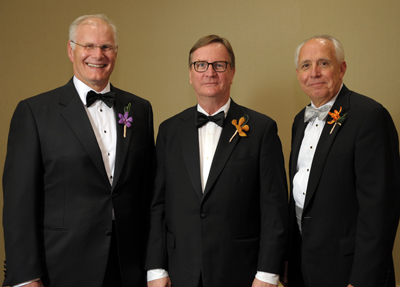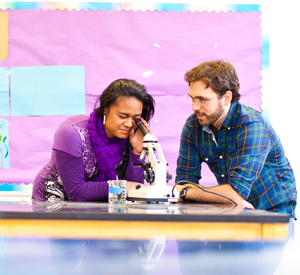UCSF School of Medicine Receives AAMC Outstanding Community Service Award
Spencer Foreman Award Recognizes Extraordinary Outreach to Communities in Need
The AAMC, the Association of American Medical Colleges, awarded national recognition to the UCSF School of Medicine and nine individuals for their outstanding contributions to academic medicine.
The awards were presented on Nov. 3 during the association’s annual meeting in San Francisco.

From left, Mark Laret, CEO of UCSF Medical Center and UCSF Benioff Children's Hospital, Sam Hawgood, dean of the UCSF School of Medicine, and Darrell Kirch, CEO and president of the AAMC, stand together at the AAMC annual meeting in San Francisco.
The UCSF School of Medicine received the Spencer Foreman Award for Outstanding Community Service, which recognizes exceptional programs that go well beyond the traditional role of academic medicine and reach communities whose needs are not being met through the traditional health delivery system. The award was renamed in 2007 to honor Spencer "Spike" Foreman, MD, who established the award in 1993 while serving as chair of the AAMC. To read about the invidual winners, go to the AAMC website.
Community service has been an important part of the culture at the UCSF School of Medicine since its physicians treated thousands of San Franciscans in need after the Great Earthquake of 1906. Since then, UCSF has strengthened its commitment to service by building lasting partnerships with the community and by coordinating efforts across the entire UCSF enterprise.
UCSF’s long commitment to community partnerships was reinforced when the University created the University Community Partnerships (UCP) Office in 2006 to help coordinate and sustain them. The UCP Office manages all academic-community initiatives and is governed by the UCP Council, which is equally composed of individuals from UCSF and local service organizations.

“The council has made a significant difference by elevating the importance of meaningful community partnerships based upon shared goals and values,” says Sam Hawgood, MBBS, dean of UCSF School of Medicine and vice chancellor of medical affairs.
Engaged community leaders rate the UCP Office a success. “The UCP Council and Office are helping community members understand the dimensions and dynamics of UCSF and UCSF members understand the complexity of our communities, and how to partner to bring relevance to both,” said one partner.
This mutual understanding has fostered a deeper level of trust between San Franciscans and UCSF. As a result, UCSF-community partnerships unite diverse voices and generate more robust and relevant outcomes.
The UCSF Clinical and Translational Science Institute (CTSI) is a cross-school, campus-wide program that helps translate research rapidly into improvements in community health. The CTSI's Community Engagement and Health Policy program administers the San Francisco Health Improvement Partnership (SF HIP) so that UCSF researchers and community stakeholders could collaborate on the city’s most compelling health issues.
UCSF's Commitment to Community
UCSF’s public mission goes beyond San Francisco, and delivers a substantial impact upon the Bay Area, all of California, the nation and the world. This impact comes not only from the institution, but also from the individuals who comprise it — UCSF’s top-notch faculty, staff and students.
Read more about UCSF's community service.
Today, five SF HIP working groups are making a difference in the lives of underserved San Franciscans in the areas of hepatitis B and children’s oral health, among others. “We bring together those who do research with those who use it to improve health outcomes,” says one SF HIP staff member.
UCSF also partners with the community to ensure that the medical school curriculum supports local needs. The Program in Medical Education for the Urban Underserved (PRIME-US) gives students interested in working with underserved urban populations a five-year track to earn a master’s degree as well as an MD degree. Its comprehensive and integrated service component prepares a diverse set of students to become leaders in caring for the urban underserved by teaching them the principles of community engagement. PRIME students disproportionately go on to perform clerkships, research projects, and residencies in underserved communities. Read more about PRIME at UCSF.
UCSF also runs many programs aimed at building the pipeline of diverse students interested in science. The Science and Health Education Partnership (SEP) with the San Francisco Unified School District is recognized nationally and internationally as a model organization that promotes partnership between scientists and educators in support of high quality science education for K-12 students. For SEP, the primary meaning of partnership is mutual teaching and learning among partners. SEP's high school program received the Presidential Award for Excellence in Science, Mathematics, and Engineering (PECASE) Mentoring for pairing high school students with a UCSF scientist-mentor. Read more about the PECASE award.
Another community outreach program, iGEM, combines high school outreach with the Genetically Engineered Machines (iGEM) competition, in which high school students compete against college students. Students from a local high school with two years of biotechnology education are eligible to work for a summer on a team mentored by UCSF researchers. In the past five years, all iGEM students have pursued higher education in science or engineering. Read more about iGEM.
Demonstrating the strength of these partnerships with UCSF, one local teacher noted, “It’s hard to be a science teacher in San Francisco and not interact with UCSF.”
Photo by Elena Zhukova

A group from UCSF gathers at the AAMC annual meeting on Nov. 3 after the School of Medicine won an award for outstanding community service.